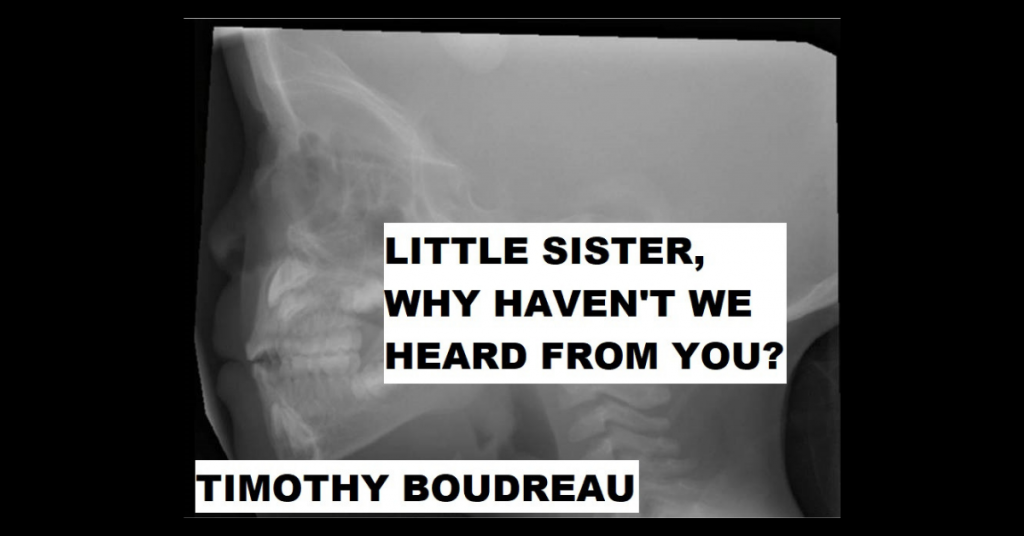We remember the shy teenager who visited aunts and uncles with a novel and a piece of knitting. The adult in an over-sized sweater, huddled in a corner over a cup of tea.
Though separated by ten years we had similar interests and for a time considered ourselves creative people.
We always meant to collaborate. What happened?
*
Especially now I feel you may have insight to offer. Wisdom from a place unknown to the rest of us.
Thus enclosed find a few ideas. Feel free to alter them in any way. Merge your memories. Melt your vision over mine like caramel over an apple.
*
Our story about a brother and sister. Begin as children, the brother thirteen, the sister three, sitting in his lap with a book. Enchanted castles, blue cheerful moons, talking animals, silver stars shining. His eyes on the page, her head tilted to watch him as he reads.
A sense of trust. A sharing of words and imagination. Her then soft hand on his knee. Her shaking laughter, curls bouncing, when he mimics the animal sounds.
*
We must allow ourselves to make brave mistakes. There will be opportunities for lyricism. There should be a place for deep feeling.
*
Her heart. A condition she was born with. Poor circulation; its inefficiency. Later this might be a metaphor for other things.
The essay she writes in her single semester at UVM, detested by her sour coven of dormmates. Her brother tries first to bully her into believing it isn’t any good. We must tell it from her side. Stress its shimmering quietude. Its common sense and strength.
*
Sister, while you consider this know also that Uncle Fred and Aunt Josie miss you terribly. Mother awaits word. She sits near the phone while looking out the kitchen window. Lights a candle; listens for the wind.
*
In our story perhaps the brother finds for a time a female companion. Jittery, frail, tongue-tied with strangers, his hands fluttering birds—yet still. The family at a loss how to explain his good fortune. Sensitive to his sister’s loneliness, when he calls he tries not to sound giddy.
It would be realistic to write a scene after the brother’s companion breaks it off. The sister is called, a sobbing message left. He mangles and repeats the phrase, But I didn’t do anything wrong. The words likely unintelligible due to the sobbing, though he’ll never know if his sister listens. Or if she does whether able to understand.
*
The sister calls some months later.
“I’m sorry but I can’t be there. Seeing Mom now makes me crazy. I have to get away.”
“Away” is a series of apartments in towns no further than an hour distant. “Away” is a bedroom to which she returns after work to read and knit, as a wind rattles the windows.
On long winter nights she masters a variety of stitches. Cabled, seed, herringbone. Waffled, cross, garter, farrow. Dreams of the undulating line formed by a succession of purls; knit stitches in mounded V’s.
*
Little Sister, as you read these understand we’re trying everything. Mother’s idea to spend time in your favorite places. At the Reading Room in the Prescott Library; on the bench next to the birdbath; along the winding path through mother’s birches where we try not to imagine you as a fallen leaf fading into the forest floor.
*
The sense of dislocation, a misplacing of years, when the older brother at last visits one of her apartments. After not having seen or spoken to her. She has called because she needs money. Her building is dark, shabby; the apartment cramped. Around the living room saucers with crumbs and saucy smears. Empty wine bottles under an end table with cracked legs.
“I’m working again.”
“I’m glad to hear.”
She asks, “Are you still at the office?”
“Yes.”
“Do you still hate it?”
He spends at most an hour. The sister is experiencing various ailments and takes miscellaneous prescriptions. She wears several sweaters. Her hair is gray at the temples though she is twenty-eight. The brother’s hair entirely white.
“The blue and white pills are for my heart. They regulate the pulse.”
“What are the yellow ones for?”
“Anxiety.”
Her skin a pellucid blue the paleness of water-reflected moonlight.
“Do they help?”
“No.”
*
Had we known your heart was as serious. We worried but didn’t know it was worse than suspected.
We swear we would’ve been there to put our arms around you.
*
Near the end of our story he runs into his sister at an outdoor event. She wears a paisley blouse and skirt; she is drunk, perhaps high. Hair short, wrists and shoulders tattooed, wearing sunglasses though rain threatens. Her fingers sketch intangible shapes in the air. She is with an older man with a cane, shawl and silver medallion. He is charming, in fact riveting. The brother knows at once that they are involved.
The man’s handshake is firm. “Ah, the brother. I’ve heard so much.”
After they part she watches her brother’s bent figure walk away. “Bye now. See you never.”
*
Little Sister, we wonder about your modes of communication. Mother’s clock that mysteriously stops and starts; inexplicable slamming doors; phenomena of other kinds. We want to believe these are signs.
We can’t be sure the extent of the powers you’ve grown into. We wonder by what hidden currents you’ll arrive, via what vivid strikes of multi-colored lightning. Some of us are afraid but we feel sure you’ll make the attempt.
*
No reason for our story to conclude with her body in bed, limbs splayed, eyelids frozen open, tongue visible between parted lips. But the family has read that approaching the final moment the dying sometimes experience an enveloping warmth and comfort. An immersion in an embracing light. Perhaps later the opportunity to reach out for those left behind. Little Sister, please don’t tell us we’ve heard it wrong.

